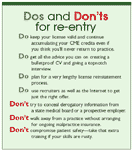Article
Finding a Job: Returning to practice
This last installment in our series tells you how to get back into medicine if you've been away for some time—or are planning on a hiatus.

"Re-entry is a growing issue because the old patterns of medicine are breaking down," says Jesse Roberts, medical director of the North Carolina Medical Board. "Doctors aren't as fixed in their location as they used to be, or fixed in medicine for that matter. Increasing numbers of women have become physicians, and many take time off from practice to start families."
Getting back into the workplace after a hiatus entails planning, patience, and possibly putting yourself back into the role of student for a while.
"To reinstate a lapsed license, often you have to start the application process from scratch," says Jeffrey Sisk, president of the Internet-based job site, PhysicianWork. "State boards vary on their requirements for skills training and timing because there's no formalized national procedure, but in general the reinstatement process can be very lengthy." The licensure board typically has to verify your information and check out disciplinary actions. As for you, there may be letters of recommendation to provide, fees to pay, and numerous forms to fill out. It's also likely that you'll have to take one or more assessment tests and attend a retraining program or proctorship.
To keep your license current, you'll pay, on average, a couple hundred dollars a year and will more likely than not have to take CME courses, but it will probably be worth it if you want to return to practice.
The road back starts with the state board If you have let your license lapse, your first step in getting back into practice will be your state medical board. You'll find contact information for each state board at the Federation of State Medical Boards' Web site, http://www.fsmb.org
Most state boards require that a license be updated or renewed within a certain period after you first applied-typically 10 years; otherwise, they require you to take the Special Purpose Examination (SPEX) to determine your current competence.
SPEX is a computerized test with 400 multiple-choice questions that focus on broad-based knowledge central to clinical encounters and good practice. The content is organized by categories of clinical problems, not by specialty areas, and it emphasizes an individual's ability to recognize frequently mishandled problems, drug interactions, ethics, and procedures. "It's a stripped down version of the USMLE," says Dale Breaden, director of public affairs at the North Carolina Medical Board.
For a list of SPEX testing centers, see http://www.prometric.com. SPEX costs $800, and study guides can run from $500 to $2,000. For more information, call the Federation of State Medical Boards, 817-868-4041.
Can the test be waived? In some states, yes, if you're certified by the American Board of Medical Specialties within your state's time limit.





